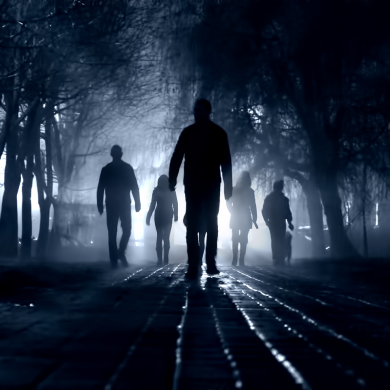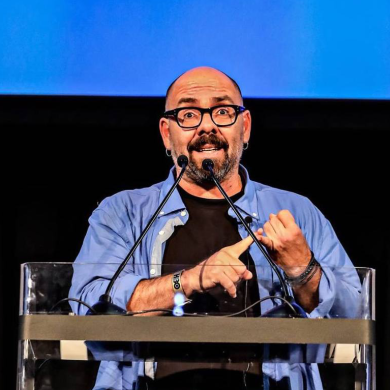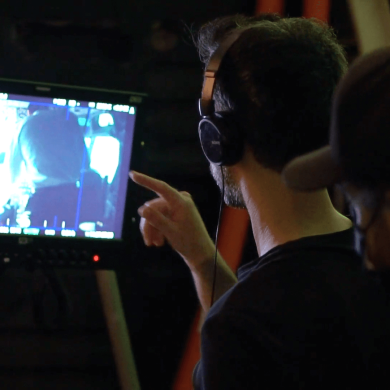By Justin Sanders
The word “passion” came up a lot during our interview with filmmaker Michael Sucsy, and for good reason. If ever there was a career origin story attesting to the power of following’s one passion over the easy path, it’s his.
Sucsy’s Grey Gardens (HBO, 2009) dramatized the real-life story made famous by the Maysles Brothers’s 1976 documentary of the same name. The film tells the tale of “Big” and “Little” Edie Beale, a high-society mother-daughter duo who turned eccentricity into a high art, determinedly holing up together in a squalid, Long Island mansion overrun with stray animals. Co-starring an indelible Drew Barrymore and Jessica Lange, Grey Gardens would go on to net a record-breaking 17 Emmy® nominations and win six, including Outstanding Made for Television Movie and, for Lange, Outstanding Lead Actress in a Miniseries or a Movie. It took home similar honors at the Golden Globes®, including another Best Actress nod – this time for Barrymore, who also won the top prize from the Screen Actors Guild. Not to be outdone, Sucsy himself was nominated for awards from both the Directors Guild of America and the Writers Guild of America.
By virtually every measure, Grey Gardens was a resounding success – made all the more impressive by the fact that it was Sucsy’s feature film debut. To make a first movie, period, is a herculean task that most people never complete. To make one as accomplished as Grey Gardens seems like a kind of miracle. But of course, there are no miracles in Hollywood. Only talent, hard work, a little bit of luck (which is worthless without the first two), and a tremendous belief in the project at hand. Anything less could have derailed Sucsy considering that, in the end, Grey Gardens took seven years to make the journey from script to screen.
Now a busy writer, producer, and director, Sucsy would go on to make beloved movies such as Every Day and the smash romantic blockbuster The Vow, but before Grey Gardens he was just another struggling filmmaker in Los Angeles, working as a personal assistant by day, scouring over his script pages in the wee hours of the morning. Thousands of would-be Hollywood filmmakers have been in the same boat. Few have prevailed. Sucsy was one of them. Despite overwhelming odds, he left a promising career directing commercials to follow his passion, and he has never looked back. This is the story of how he did it.
JUSTIN SANDERS: Growing up, did you see yourself becoming a filmmaker?
MICHAEL SUCSY: I loved movies as a kid, but I grew up in New England, so I didn’t know people whose fathers and mothers were directors. I didn’t really think of it as a job.
But I also loved advertising, and while I was studying foreign relations at Georgetown University, I ended up getting a summer internship in New York at a division of the Saatchi and Saatchi agency. I started on the account side, but then the next summer I went back to work for their producers, who were doing a bunch of commercials for clients like Staples and Little Ceasars.
That’s how I got on set for the first time, and that was sort of an awakening for me – I just loved it. So, my senior year at Georgetown, they were shooting the exteriors for the movie The American President with Michael Douglas and Annette Bening in D.C. and I finagled my way on set as a production assistant.
JS: How did you do that?
MS: This was back when you had to fax your resume in – so, I did that and didn’t hear anything, and then I faxed it in again and still did not hear anything. Eventually, their second AD (assistant director) called me in – I think mostly to get me to stop faxing them. They handed me a walkie-talkie on my first day, which I had no idea how to use, and somehow, I kept finding myself next to [the film’s director] Rob Reiner, just watching what he was doing. I had this way of avoiding getting stuck way out in the weeds and getting myself close to where the action was.
When I graduated from Georgetown, I kept working on film sets in New York – as a PA, but also as a production secretary, an art department coordinator, and other jobs. I worked on big movies like Roland Emmerich’s Godzilla. I ran first team on The Siege with Denzel Washington. I was on the path to becoming an assistant director (AD), but eventually I realized that I really wanted to be a filmmaker. So, I came out to Los Angeles and got my MFA at ArtCenter College of Design in Pasadena.
JS: How did you decide on ArtCenter for your filmmaking education?
MS: I wanted to work coming right out of school. And ArtCenter has a very good reputation for commercial directors. Michael Bay went there, as well as Tarsem and a bunch of other big commercial directors.
JS: So, your goal was to make commercials after film school?
MS: Yes, and I did wind up getting commercial jobs and enjoying them, but it wasn’t my passion. I realized that even if I made it to the top of the advertising profession, I would still want to be on that mountain over there – and that mountain was narrative filmmaking. That’s when I identified Grey Gardens as the first feature film project that I wanted to make.
JS: How did that decision come about?
MS: At the time, I was actually writing a novel, thinking I would then maybe adapt it into a screenplay. It was about a twin brother and sister who had an eccentric mother, and they all lived in a vacation hamlet on the East Coast.
Around that time was when Criterion put the documentary Grey Gardens out on DVD. I had known about the movie for a long time, but I had never seen it. I got ahold of the DVD and that’s when the epiphany came. It was thematically what I had already been writing my novel about, but a better vehicle for a narrative film.
So, I put my book project aside and just completely dove into the script for the feature film version of Grey Gardens.
JS: What did that process of diving in entail?
MS: The internet was very limited back in those days in terms of what information was available on the two Edies, so I dove into analog tools like microfiche. That was how I ended up finding “Little” Edie Beale’s death certificate, and through that document, I located the executor of her estate. Then, through the executor, I tracked down two of her nephews, who lived in California at the time. I wrote them a 10-page letter about why I was so passionate about making Grey Gardens, and asking if they could impart anything that could help me out. They replied saying they didn’t really have anything – except for this old box full of her stuff.
I said, “What do you mean a box of her stuff?” and they said, “Oh, just like her diaries and poetry and letters and stuff.”
[Laughs] I was like, “Oh, is that all?”
So, I locked up my apartment and I moved up to San Francisco for the summer, and sat at their dining room table and read everything in this box they had. I got exclusive access to all of it through the family, and that became the basis for a lot of my research.
JS: But you were a total stranger to them. What compelled them to trust you like that?
MS: Well, I believed in the material. I didn’t just call up and say, “Hey, I’ve got this idea for a movie.” I wrote them a 10-page letter! I was passionate.
JS: But why did you feel so passionate about this particular story?
MS: Both “Little” Edie Beale and her mother, “Big” Edie Beale, had an indominable spirit that I find inspiring. Also, my paternal grandmother, who I was very close with, was kind of a combination of the two of them. She was a born performer but also a school teacher in the state of Connecticut where, at the time she was working, if you were a woman and got married, you had to quit. Women were restricted then for no reason other than they were women, and the Edies were each experiencing something very similar in their respective generations. And yet, despite their circumstances, they wanted to persevere and be themselves, and live on their own terms.
And then, I’m also from the area where the Grey Gardens mansion is located. My parents have owned a house on Long Island since before I was born. Eastern Long Island is home to me. I went to Deerfield Academy, which is kind of the brother school to Miss Porter’s School, where Little Edie went. So, I understood that world really well, and the conventions that the Edies were pushing back against.
And finally, I’m not shy about saying that I thought I could get great actresses to play the roles. I knew that would go a long way to getting the movie made.
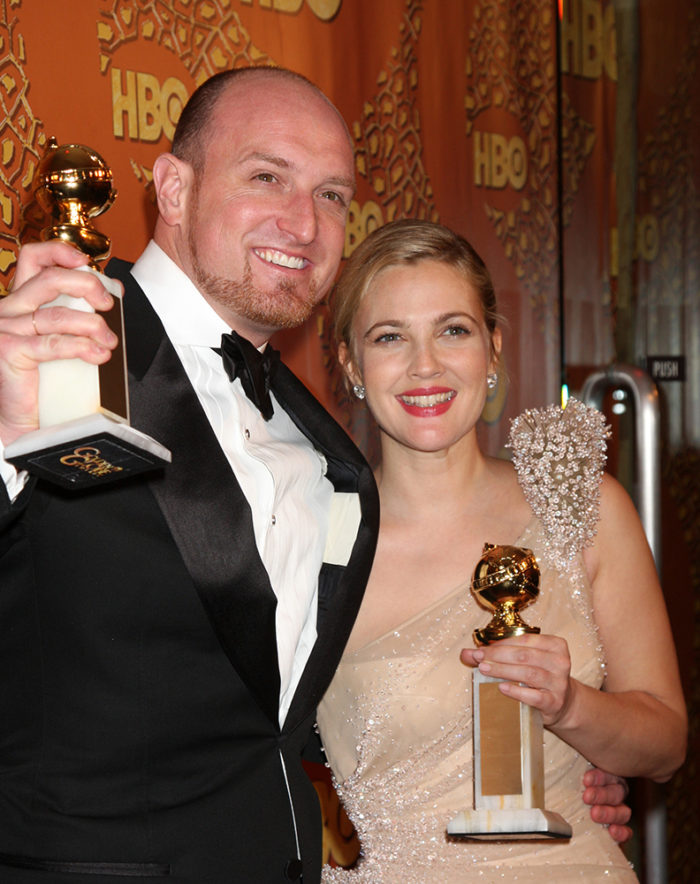
JS: And you did. You got Drew Barrymore and Jessica Lange to play the lead roles. How did you manage that as an unknown filmmaker without a credit to your name?
MS: When I was in college at Georgetown, there was a woman in my class named Lucy Barzun (now Lucy Barzun Donnelly), who had gone on after college to work with John Lyons when he was president of Focus Features.
After I started working on Grey Gardens, our 10-year class reunion was announced. I knew Lucy was in the film industry, so I sent her the script and told her I was going to be at the reunion. She replied saying she wasn’t going to the reunion, but then she changed her mind after reading half the script and jumped on a train from New York down to DC.
Within a couple weeks, I invited Lucy to come onto the project formally – and she was a great partner. She submitted the script to CAA and it found its way to Peter Levine, who represents both Drew Barrymore and Jessica Lange. I went to New York to meet with Jessica first, where I learned that she had already discussed the Grey Gardens documentary with Peter as a possible adaptation project, and it was about two or three months later that my script had come across Peter’s desk. It was kismet!
JS: But Lange had a reputation for transformative performances already. Barrymore’s turn as Little Edie, however, surprised a lot of people. How did you know Barrymore was the right choice?
MS: Even though I believed it would be a great film, female-driven period pieces are not easy to get made and I needed an actress who would not be a fair-weather friend. Our shoot was delayed an entire year and Drew kept turning stuff down to stay attached. She came and sat multiple times for major makeup prosthetic sessions. The amount of time she invested in Little Edie’s dialect and all the details of her character is well-documented.
That kind of dedication came across from the very first time we met. We had a meeting and Drew’s passion and reasons for connecting with the character absolutely won me over. When she left, I turned to Lucy and I said, “We just found our leading lady.”
I had not been expecting that!
JS: Was it nerve-wracking at all, having two legitimate movie stars express interest in your very first project out of the gates?
MS: Even though it was my first movie as director, I had worked on a lot of big movies with a lot of big actors in other capacities, so I didn’t feel overwhelmed by that. It was much more important to me to find somebody interested in doing the work to become these characters. Jessica’s role, for instance, was going to cover 40 years in the movie. She would look amazing in some scenes and like hell in others. I had to know that was okay with her. I was more concerned with finding someone I could have a dialogue with than I was in finding a movie star.
JS: You’ve said in other interviews that, from start to finish, Grey Gardens took seven years to make. A duration like that is not unusual in the film business, but fill us in on what was happening during all those years. Why does it take so long?
MS: Well, I started researching in 2003 and I had finished a draft of the script by 2005, so there are two years right there. It sounds like a long time, but I had to do job stuff in there in between all the research and interviewing and just… finding the story.
JS: You said you quit doing commercials. What was your day job?
MS: I worked for an entertainment attorney as his assistant. When I started meeting with actresses for Grey Gardens, I had to quit. [Laughs] But he is now my attorney, so it worked out.
JS: Gotcha. Okay, continue walking us through the steps of the film’s journey toward completion.
MS: The fall of 2005 was when I partnered with Lucy and met with Jessica Lange. Our other producing partner, Rachel Horowitz, also came aboard at the time. Drew was cast in February of 2006, so then it was a matter of taking the package of the actresses and the script out to a bunch of different financiers. Then HBO came in, and they had me do a bunch of rewrites in the summer of 2006.
JS: What kind of rewrites?
MS: I had written the script linearly at first, which was an expensive proposition because there were funerals and weddings and all these big set pieces. HBO needed to cut tens of millions of dollars out of the budget, and the only way to do that was to isolate the story to the Grey Gardens house, to get rid of all those locations. They brought another writer in, and that was tough for me at first, but the process really helped get the script into a structure that allowed us to make the movie.
A year from then was when we finally started shooting, in October of 2007. Then, because HBO had a bunch of other stuff in the pipeline that already had release dates, we ended up being in post for yet another year.
JS: When the movie finally came out, in 2009, it was nominated for just about major award that it could be, and won several of the biggest. I can’t imagine how validating that must have been after all you had been through to get it made.
MS: When I first switched to filmmaking my father said, many times, “What’s your plan B?” And I had to tell him, “There is no plan B.” He didn’t understand my decision at all, but being up on that stage and winning an Emmy® – then he understood.
You don’t do it for that validation but I’m not going to pretend the validation doesn’t feel great.
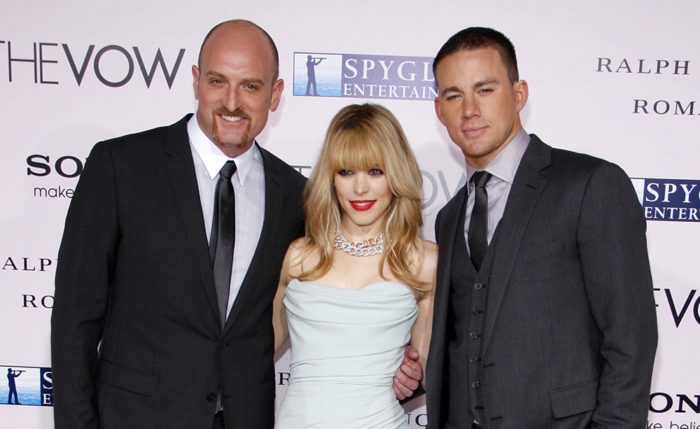
JS: You followed up Grey Gardens by directing The Vow, which was a big, glossy studio romance, and a huge hit for Screen Gems and Spyglass Entertainment. What was it like transitioning from writing and directing your own seven-year passion project to helming someone else’s global blockbuster?
MS: It was definitely a different process in that Grey Gardens was self-generated and with The Vow I was coming in to this studio project that had been in development for something like 14 years. A whole week went by of filming before I felt like I was really “inside” that movie as a filmmaker. It was very different.
JS: Did the financial success of The Vow give you a lot of creative freedom in terms of deciding what to do next?
MS: [Laughs] No, it had the opposite effect. Hollywood very much likes a repeat performance out of people. They are a risk-averse industry that wants you to do what you already did again. I was very proud of making The Vow, but I didn’t want to make it again, and yet, I kept getting offers to do so – over and over and over again. I was fearful that if I did do something just like The Vow, I would be pigeon-holing myself within the industry. I turned a lot of projects down for that reason.
JS: Hollywood is such a fickle industry. Wasn’t it scary to turn down jobs in a business where offers can dry up at any minute?
MS: It’s a valid question, but it’s not the right way to look at the situation. If you take a project for the wrong reasons, you’re screwed.
JS: Why?
MS: Because not every movie takes seven years, but for the director, they all take at least a year – and sometimes longer. And if you don’t care passionately about it and you don’t feel that you can give all of yourself to it, you’re going to run out of gas and you’re not going to be able to complete it at a high level of quality.
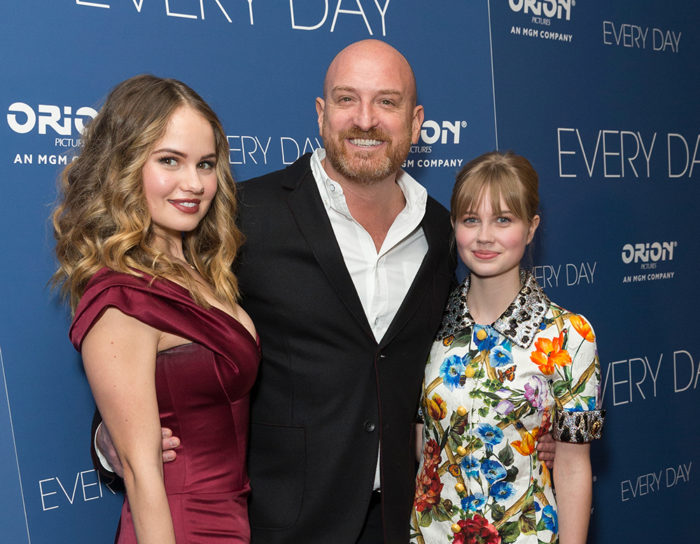
JS: After The Vow, you made Every Day, a romantic drama about a shy teenager who “falls for someone who transforms into another person every day” (IMDb). What about that story did you feel passionate about?
MS: The premise was what really excited me. It’s a young-adult teen romance but it’s some pretty deep stuff – the concept of learning to love somebody for who they truly are, and not how they are physically manifest in their body, is a beautiful concept. It’s the ultimate in spiritual evolution, and the idea of having 15 actors playing one character seemed like something that hadn’t been done before. I loved working with such a young cast and I loved making that movie. It was really exciting!
JS: What’s next for you?
MS: I’ve written an adaptation of the book, Playing to the Gods, about the remarkable French actress Sarah Bernhardt and her Italian rival, Eleonora Duse. It’s another historical epic with super-three-dimensional female characters who are the bomb. I’m as passionate about this story as I was about Grey Gardens, and it, too, has taken years to get to where it is now.
JS: I can’t wait to see it. Any parting words of advice for aspiring filmmakers?
MS: When they say, “write what you know,” they don’t mean that just because you worked at an ice cream shop when you were 15, you should tell that story – I mean, if it’s a good story, then sure, write that. The point is, each of us has a unique outlook and view on the world that is so easy to take for granted – because it’s how we see the world – and yet it is by definition unique.
Hollywood knows how to make movies, but it is always in need of ideas and a perspective. That’s what you’re selling when you go into a room to pitch something, whether it’s your own original idea or your take on material that they’ve been developing. It’s your point of view, your experience. You’re there to infuse yourself.
As a filmmaker, you are your best commodity.
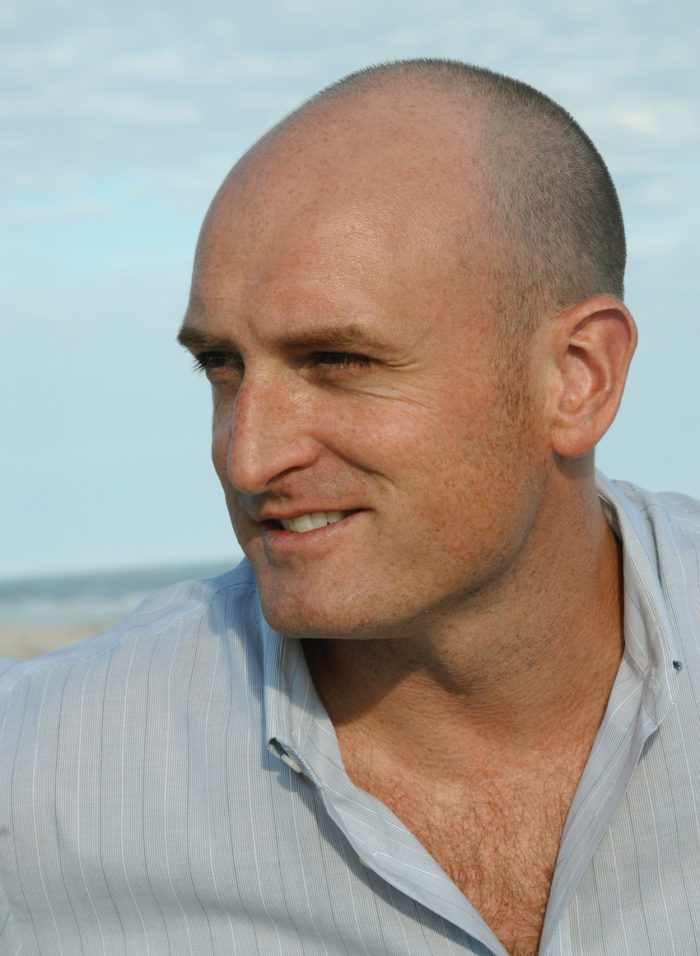
#StandCreative

